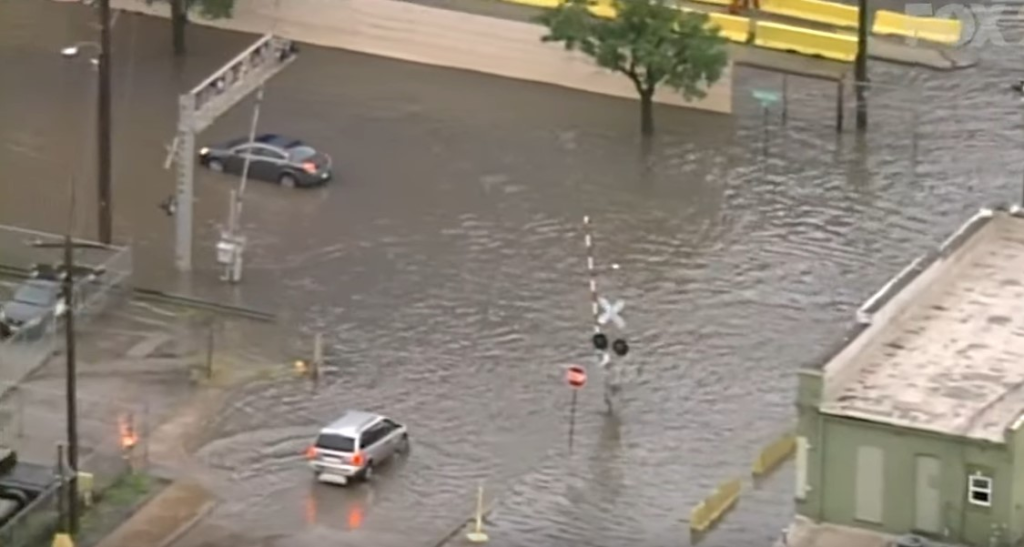Sustainability challenges have long been a problem that many communities worldwide found to be difficult to solve. These challenges are also known as wicked problems since these issues can never truly be resolved. One common wicked problem many people in the St. Louis or Metro East areas face on a daily basis is water equity. Due to their close proximity to the Mississippi River, people in the community often face problems revolving around flooding, clean water, and river transportation are often. Granite City, for example, has a massive problem with flooding after storms. So much to the point where almost every street is covered in water after it rains. While this issue may not seem like it qualifies as a “wicked problem”, once you start to examine it more, it is clear that this problem is not one that can be easily solved.

Many people who live in Granite City would consider the flooding to be a consistent problem in the town. “Granite floods” is a statement well known by the people who live in the city. However, while the people may agree on this being an issue, the city might not have the same view on this matter. While efforts have been made in the past to prevent flash floods like the ones that happened in 2019 and 2022, nothing major has changed since then. One family even filed a complaint against the city, pinning the blame for the flood on poor sewer systems and drainage ditches. Yet, the same problem arose in 2021 and 2022, with reports of 9 inches of rain covering streets and flooding homes. Aside from the fact that the flash floods do not have a clear problem definition, there is also no evident solution for this situation. Granite City does not exactly have the best track record for resolving issues on their roads. One case of this is a pothole in the middle of Maryville Road. For years, the road has periodically been blocked off for repairs. But no matter how many times the road is “fixed”, the issue always seems to come back. Even if the city puts all their effort into improving the sewer and drainage systems, there is always the possibility that future flash floods will continue. Whether the city decides to act on this wicked problem or not, the fact that there is no definite solution to the flooding will always be an obstacle in their path.

Through deeper examination, the long-term effects of this problem also impact how quickly the issue can be fixed. If the core challenge at hand is the sewage and drainage systems in Granite City, the solution might not be as simple as one would think. Even if the sewage systems were removed and replaced by new ones, there is always a possibility that this replacement could be done wrong. If that were to happen, it could cause sewage to leak out in the wrong places, creating an entirely different problem throughout the city. This creates the whole concept that many solutions for wicked problems could often cause irreversible affects even though they were originally implemented to fix the problem. These solutions cannot be quickly applied in case they are to backfire. At the same time, the urgency of these problems also requires quick attention. There have already been multiple flash floods throughout the past few years. In each case, the water has seeped into people’s houses and soaked most of their belongings. If it has happened in the past, it can easily happen again in the future. The city needs to make efforts to combat against a future flood before it happens again. These two traits make this issue even more difficult to solve, since the problem needs to be solved soon to prevent an incident from occurring again, but not too soon because that could also result in the solution creating unintended side effects that could be irreversible. This is why it is crucial for people to understand the complexity of wicked problems, so a simple solution is not applied to an intricate issue.

The flash flooding in Granite City is only one example of the wicked problems related to water equity in our communities. East St. Louis is another prominent area that often experiences flooding after storms. While solutions applied to Granite City could also be applied to East St. Louis, it is important to realize that every city is different. The resources that are available to help Granite Citizens may not be accessible for people in East St. Louis. Along with that, water equity does not just apply to flooding. Clean water and transportation on the Mississippi River are other topics often discussed in areas closer to St. Louis. The fight for fixing water-related issues in our communities is an ongoing battle that will take effort from everyone to start resolving.
Brannan, Dan. “Granite City Battles Flash Flooding Issues with Improvements, Mayor Says More Work Left to Do.” RiverBender.Com, 26 July 2022, www.riverbender.com/articles/details/granite-city-battles-flash-flooding-issues-with-improvements-mayor-says-more-work-left-to-do-60187.cfm.
Koziatek, Mike. “Her Basement Flooded Again. Now She Wants Granite City to Fix Its Drainage Problems.” Belleville News-Democrat, 18 Aug. 2019, www.bnd.com/news/local/article234117542.html.